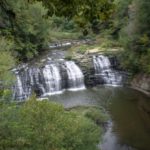It’s 2 a.m. in the morning. I know this because I have consistently checked my phone every hour for the past three hours. It’s the dead of night: the wind is harshly whipping against my tent, my body is in a state of what feels like near hypothermia, and my back will surely need a chiropractic adjustment when I return to civilization. As a lay awake, amid a dreamless night of restless sleep, I think to myself “I will never backpack again”. Yet somehow, after a few weeks have passed and I do a bit more research, I find myself outdoors and sleeping a little better every time.
Spending a night in the great outdoors on a backpacking trip requires comprise and a decent amount of grit. You’ll have to part ways with your gel pillow, memory foam mattress, Egyptian cotton bed sheets, and the pleasant sounds of your sound machine. Luxury will be foregone and you’ll be forced to bring the bare minimum. Luckily, restful sleep is attainable in the backwoods if you have the right supplies.
From the self-proclaimed lightest sleeper in the world (me) to you, here are my must-haves for getting a restful night of sleep while backpacking.

Comfortable Pillow
When it comes to backpacking, you’ll need to leave your contoured neck pillow at home. Instead, you’ll need to find a more compact alternative that is lightweight and easy to carry in your pack. A pillow like the
Therm-a-Rest Compressible Pillow
is a good option for campers and backpackers alike. It packs small but expands big when it comes time to rest. And the biggest plus: it’s comfortable to sleep on all night.
Noise Cancelling Earplugs
If you are used to sleeping in complete silence, a night outdoors can completely throw off your sleep cycle. No matter where you set up shop to sleep, you’ll hear a wide range of sounds throughout the night from nocturnal animals scampering in the distance to the rushing of a nearby stream. The best way to mimic your typical sleeping environment is with a good set of ear plugs. HEAROS Xtreme Protection Noise Cancelling Earplugs are a good option for cancelling noise as much as possible. With a NRR 33 rating, they have the highest noise reduction rating possible.
Adequate Padding
If you’re a light sleeper like me, you are most likely used to sleeping on some sort of mattress pad. As much as I’d love to pack my mattress pad and throw it in my backpack to ensure a good night’s rest, this is seemingly impossible. Fortunately, I have the next best thing for overnights outdoors: a sleeping pad. A sleeping pad like the
Klymit Static V Lightweight Sleeping Pad
allows me to sleep comfortably all night. It’s design also minimizes air movement and heat loss, a huge plus for those that get cold easily. With any sleeping pad, make sure it is lightweight and easy to transport.
Good Shelter
In your home, you have the confines of your bedroom to keep you warm and safe. Outdoors the equivalent of your bedroom is a tent. Your tent is your main form of protection, which means you will want to invest the most in this piece of equipment. You’ll want something: lightweight, easy to transport, easy to assemble, and that offers adequate protection. I splurged on the ALPS Mountaineering Lynx 2-Person Tent because I needed a waterproof tent that could comfortably accommodate two people. At 5 pounds in weight, it isn’t the most lightweight option but can easily accommodate two backpacks and sleeping pads while providing effective shelter.
Sleep Mask
The natural light of the day is unforgiving. It doesn’t let you draw the blinds and continue sleeping for the next two hours. It forces you to wake when the sun rises and prepares you for slumber when the sun sets. If you’re not feeling excited for a 6am wake up call, you can enlist the help of a sleep mask. Sleep masks are the ideal travel accessory with their light weight, small footprint, and easy storage. The ALASKA BEAR® sleep mask is ideal for total blackout, has an adjustable strap, and fits comfortably with ear plugs. It’s also highly affordable.
Insulated Sleeping Bag
One of the most surefire ways to get a good sleep is to stay warm throughout the night. This can be achieved with the right sleeping bag. You’ll want a sleeping bag that is not only lightweight but also ultra-warm. The TETON Sports Tracker +5F Ultralight Sleeping Bag provides more room than most sleeping bags, is easy to carry, and comes with a 3-piece hood contour to keep your head warm. It also is designed to battle the elements with an anti-snag zipper. At only 4.1 pounds and a lifetime warranty, it’s been one of the best backpacking investments I’ve made.
Water Bottle
The worst thing while backpacking other than having to wake up and venture into the cold to use the restroom at night, is having to go find water. If you’ve had a long day of hiking, your body will want to stay hydrated, even while asleep. Unknowingly you may find yourself parched in the middle of the night. To avoid having to leave the confines of your warm sleeping bag and possibly disturb your partner, keep a water bottle next to you while you sleep. The
LifeStraw Go Water Bottle
is a good choice for camping and backpacking as it doubles as a filtration system and a water bottle. It’s durable, lightweight, and easy to fill up before it’s bedtime.
In addition to these must-haves, there are a few other ways to achieve more restful sleep while backpacking. This includes:
Choosing a Flat Sleep Site: Find a location that is flat, sturdy, and free from large rocks, sticks, plants, or other obstructions that could affect your comfort.
Wear Comfortable Clothing: Avoid going to sleep in damp clothing. This can be prevented by packing one warm outfit specifically just for sleeping at night. Make sure to cover your ears and head at night with a beanie if you’ll be sleeping in cold climates.
Relieve Yourself: Use the restroom within fifteen minutes of turning in for the night to try to avoid midnight bathroom breaks.
Keep Supplies Nearby: Sometimes a late-night bathroom break is unavoidable. To prepare in advance, keep a pair of shoes and a light by your sleeping bag just in case.
With these tips and tricks in mind, here’s to hoping your next overnight wilderness experience leads to restful sleep to keep your energized for the adventures to come the next days.





